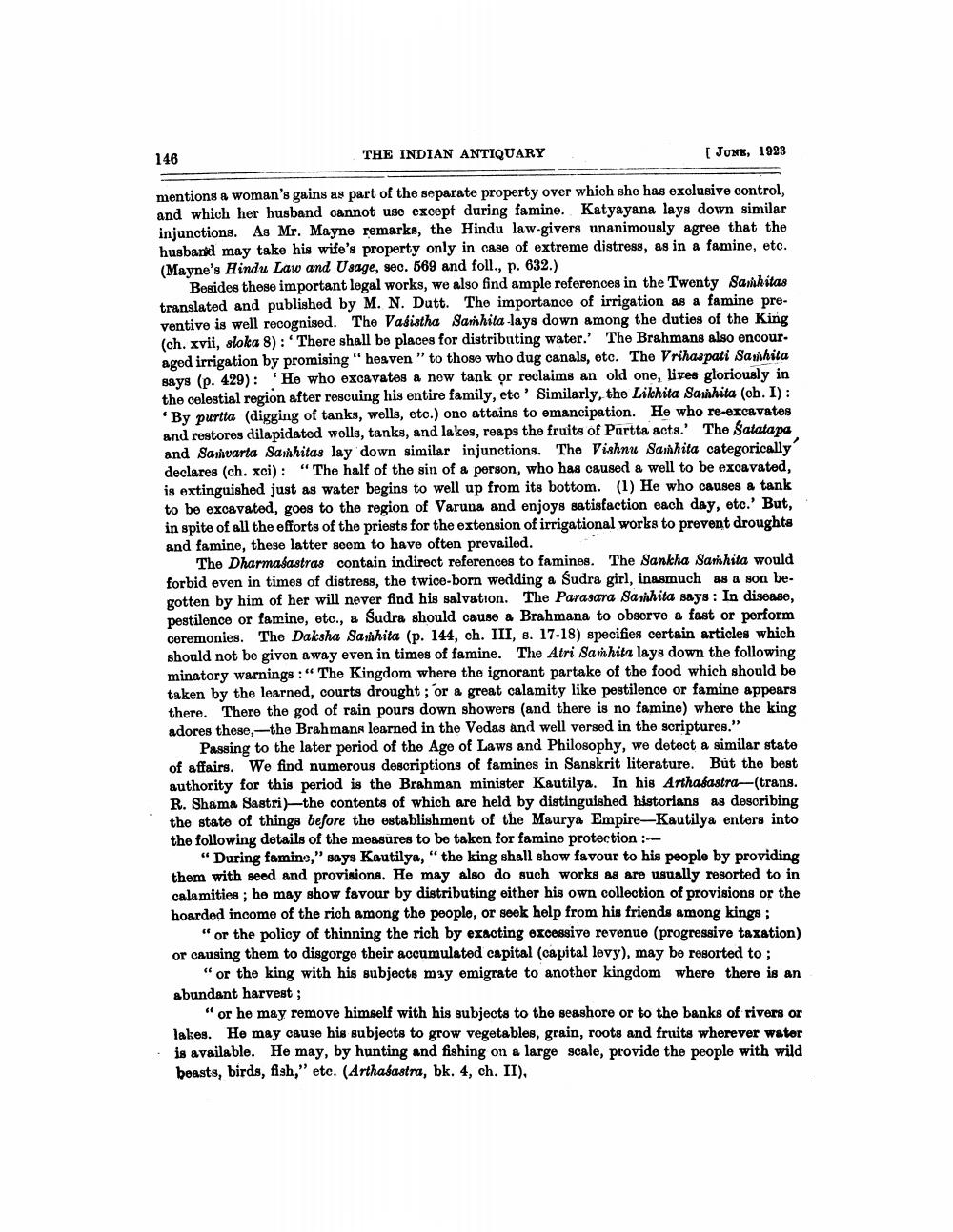________________
146
THE INDIAN ANTIQUARY
[ June, 1923
mentions a woman's gains as part of the separate property over which sho has exclusive control, and which her husband cannot use except during famine. Katyayana lays down similar injunctions. As Mr. Mayne remarks, the Hindu law-givers unanimously agree that the husband may take his wife's property only in case of extreme distress, as in a famine, etc. (Mayne's Hindu Law and Usage, sec. 569 and foll., p. 632.)
Besides these important legal works, we also find ample references in the Twenty Sanhitas translated and published by M. N. Dutt. The importance of irrigation as a famine preventive is well recognised. The Vašistha Samhita-lays down among the duties of the King (ch. xvii, sloka 8): 'There shall be places for distributing water.' The Brahmans also encour. aged irrigation by promising "heaven" to those who dug canals, etc. The Vrihaspati Sanahita says (p. 429): 'He who excavates a now tank or reclaims an old one, lives gloriously in the celestial region after rescuing his entire family, eto' Similarly, the Likhita Sanhita (ch. I):
By purtta (digging of tanks, wells, etc.) one attains to emancipation. He who re-excavates and restores dilapidated wells, tanks, and lakes, reaps the fruits of Purtta acts.' The Satata pa and Sanivarta Sannhitas lay down similar injunctions. The Vishnu Sanhita categorically declares (ch. xci): "The half of the sin of a person, who has caused a well to be excavated, is extinguished just as water begins to well up from its bottom. (1) He who causes a tank to be excavated, goes to the region of Varuna and enjoys satisfaction each day, etc. But, in spite of all the efforts of the priests for the extension of irrigational works to prevent droughts and famine, these latter seem to have often prevailed.
The Dharmasastras contain indirect references to famines. The Sankha Sarshita would forbid even in times of distress, the twice-born wedding a Sudra girl, inasmuch as a son begotten by him of her will never find his salvation. The Parasara Samhita says: In disease, pestilence or famine, etc., a Sudra should cause a Brahmana to observe a fast or perform ceremonies. The Daksha Sanhita (p. 144, ch. III, 8. 17-18) specifies certain articles which should not be given away even in times of famine. The Atri Samhitz lays down the following minatory warnings : " The Kingdom where the ignorant partake of the food which should be taken by the learned, courts drought ; or a great calamity like pestilence or famine appears there. There the god of rain pours down showers (and there is no famine) where the king adores these, -the Brahmans learned in the Vedas and well versed in the scriptures."
Passing to the later period of the Age of Laws and Philosophy, we detect a similar state of affairs. We find numerous descriptions of famines in Sanskrit literature. But the best authority for this period is the Brahman minister Kautilya. In his Arthafastra(trans. R. Shama Sastri)—the contents of which are held by distinguished historians as describing the state of things before the establishment of the Maurya Empire-Kautilya enters into the following details of the measures to be taken for famine protection :
“During famine," says Kautilya," the king shall show favour to his people by providing them with seed and provisions. He may also do such works as are usually resorted to in calamities; he may show favour by distributing either his own collection of provisions or the hoarded income of the rich among the people, or seek help from his friends among kings;
" or the policy of thinning the rich by exacting excessive revenue (progressive taxation) or causing them to disgorge their accumulated capital (capital levy), may be resorted to;
" or the king with his subjects may emigrate to another kingdom where there is an abundant harvest ;
" or he may remove himself with his subjects to the seashore or to the banks of rivers or lakes. He may cause his subjects to grow vegetables, grain, roots and fruits wherever water is available. He may, by hunting and fishing on a large scale, provide the people with wild boasts, birds, fish," etc. (Arthasastra, bk. 4, ch. II),




